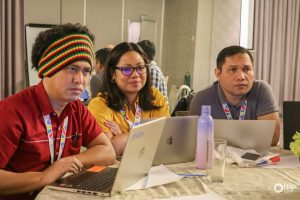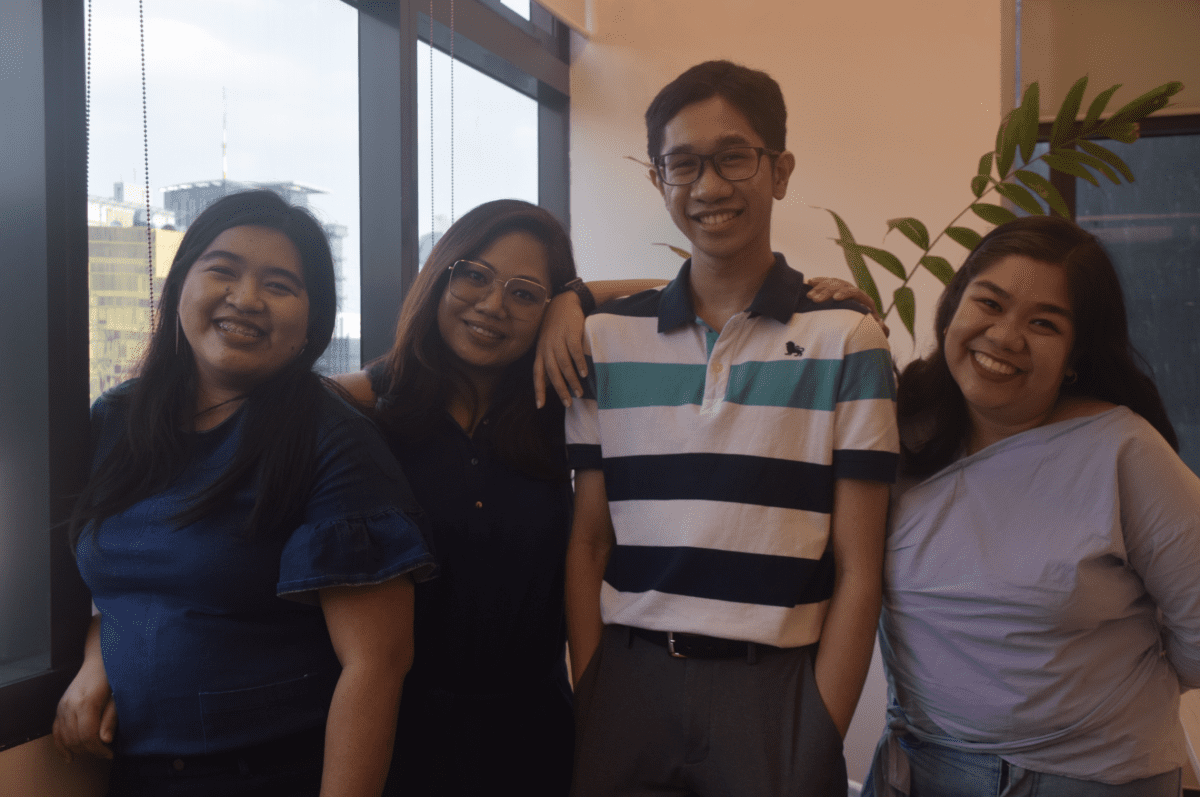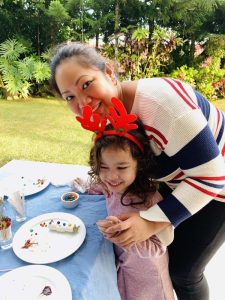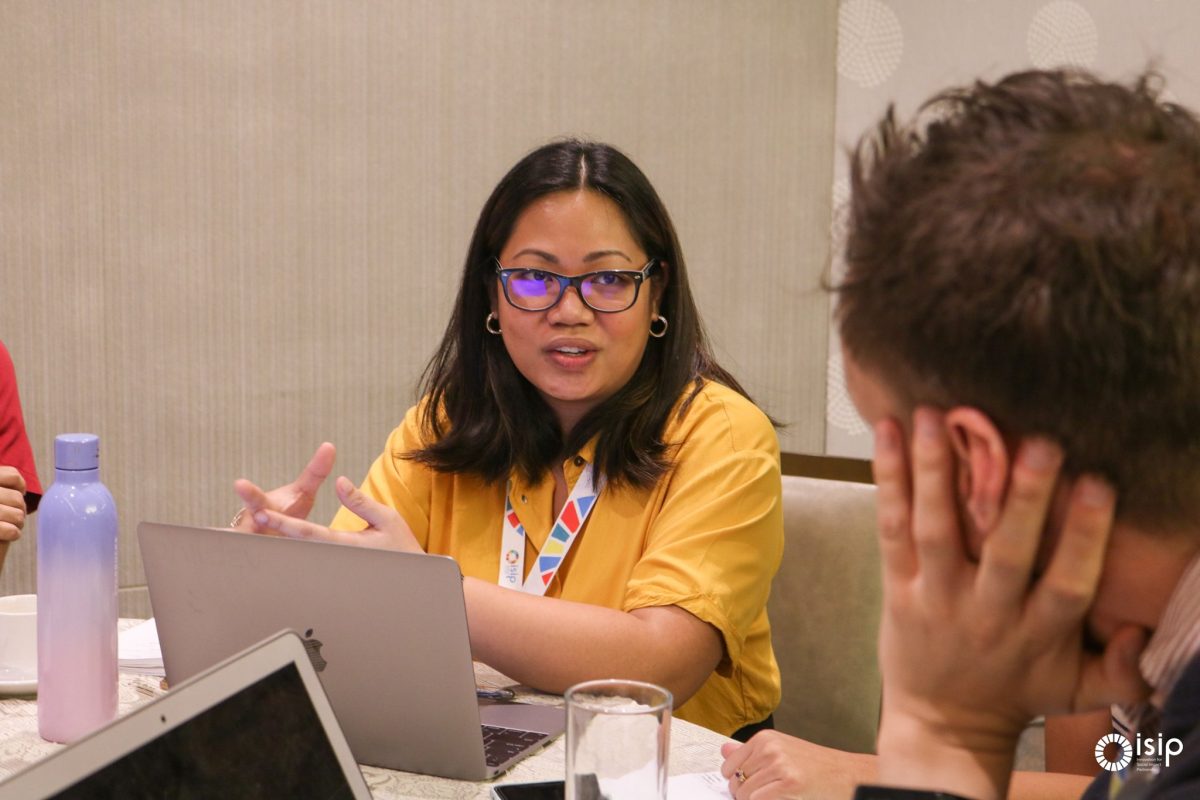by Bella Angela Del Rio
“My motivation is to help universities establish and improve their entrepreneurship programs so that when Amia [her child] gets into college, she would have all these opportunities and support available to her.”
 Meet Patricia “Sasa” Siriban – mother, manager, and masters student.
Meet Patricia “Sasa” Siriban – mother, manager, and masters student.
Sasa’s 7-year journey in PhilDev has supported the growth of the startup ecosystem. She started working with PhilDev to help universities elevate their entrepreneurship programs. Now she is leading one of PhilDev’s projects to incubate early-stage startups in the Philippines.
During our conversation, it has been empowering to listen to the story of a woman like Sasa. She shared about her journey of joining the development sector and how she has managed to make it as a manager at PhilDev, while being a mother and an MBA student in Ateneo de Manila University.
Can you briefly share your experience prior to joining PhilDev and how this led you to being part of this organization?
Sasa: Before PhilDev, I worked for the American Chamber of Commerce in the Philippines for about 3 years as a committee coordinator. I handled 5 committees mainly on trade and investments, energy, power, agriculture, business, health, and environmental quality management. My role was to organize events and meetings that support foreign and direct investments in the country for those specific industries because AmCham’s overall goal was economic growth through such investments. I left the company in 2014 when I got pregnant and only continued to work when Amia (her child) was born.
It was kind of strange when I was looking for a new job. My criteria was completely different. I started looking for opportunities in the development sector because it was the first time I heard about inclusive economic growth when I joined PhilDev and became aware of the development sector space. It was earning money to do good. It wasn’t earning money just to earn money, and that really ignited something in me. What drew me into the organization was the vision of eradicating poverty through education, innovation, and entrepreneurship. At the time, it looked like it was sort of aligned to what I was already doing – economic growth – but focused on inclusivity. So I was like, “let’s shoot our shot,” and 7 years later, here we are.
What has your experience been like with PhilDev over the past 7 years?
Sasa: Back in 2015, I started in PhilDev as a program coordinator for the Innovative Development through Entrepreneurship Acceleration (IDEA) project funded by USAID. I was very lucky to have an empowering boss and mentor. The management has always pushed me to take ownership and leadership of the activities that were assigned to me. Even if I was a coordinator, my role went beyond that by providing briefings to the director and the officers, and I also provided them with assignments for each session. This helped me hone my leadership skills as well as my skills in project management, allocating resources, and providing tasks to people.
What is good about PhilDev is they encourage the staff to take advantage of the learning opportunities. We conduct a lot of training and on top of organizing all these events, we are also expected to listen and learn from the experts. Back in 2015, I handled the visiting professor activities at that time. And when joining the professors to different universities, I listened to the lectures. In reality, you’d actually get access to all this free training, so of course, I maximized it and this improved my appreciation for innovation and entrepreneurship, and advanced my role within the organization.
What is the difference between collaborating with our startups and working with universities?
Sasa: It is a completely different setup that I am working in. InitiallyI was working with the academe, but now I am working with startups. All the activities are very systematic and in order when it comes to collaborating with universities.
Working with startups is a different story. Their problems are different every single day and at the same time, you don’t know when you are going to be able to talk to them. So there is a learning curve in a way, but it was really fun learning from them and learning about their challenges. It makes us think about what programs and activities we could implement to address those challenges.
What are some of the challenges the startups are facing?
Sasa: Initially, when I was working with universities they kept talking about the “valley of death,” and I thought, “Is this just an excuse to say that you can’t do it?” or, “is it hard for you to make a successful startup?”
Well, we learn something new every day. Working under the Incubation, Development, and Entrepreneurial Assistance (IDEA) project in collaboration with DTI, I’ve worked with early-stage startups, and it was validated that the “valley of death” is really a lump for our startups. This is especially seen with the types of startups that universities produce. Those startups that are working on research, focused on hardware or machinery, need substantial capital to produce enough units for selling.
 Unfortunately, the funding facility here in the Philippines has high requirements, and they need to be in business for at least a year or have the traction of x millions of pesos before they can receive funding. So unless they bootstrap 10 million pesos, their startup dies before it even starts. That was one of the greatest lessons that I’ve learned shifting from the academe to enterprise development.
Unfortunately, the funding facility here in the Philippines has high requirements, and they need to be in business for at least a year or have the traction of x millions of pesos before they can receive funding. So unless they bootstrap 10 million pesos, their startup dies before it even starts. That was one of the greatest lessons that I’ve learned shifting from the academe to enterprise development.
Another challenge in the education system is having that available funding for startups in the universities. Budget for pitch competitions now is no longer enough; they need support to be able to build their products and mass-produce them. Except for their training on the business model canvas and all that, I think it is high time that we elevate in terms of allocating a sustainable amount of funds to operationalize Technology Business Incubators (TBIs). Majority of TBIs now rely on government funding or other types of funding. Perhaps universities might consider providing funds for TBI operations.
How else can we further support the startup ecosystem?
Sasa: I think we need more meaningful collaborations between sectors. Right now, we are way past providing the short term training, lectures, and pitches. First, as I mentioned, the academe should continue to infuse entrepreneurship in their curricula, so that research outputs don’t only look at solving problems but also look at the people that will pay for the solution. Governments should also consider leniency in terms of grant eligibility. If this happens, perhaps more opportunities for startups that come from universities will have more chances in at least getting started and meeting the demand of their possible clients. Most startups don’t have runway money even to work on government compliance. Bootstrapping right now does happen, but with the socio economic situation in the Philippines, sometimes bootstrapping is difficult.
For Enterprise Support Organizations like PhilDev, we should continue creating programs that fill the gap between the capacities of the startups and bridging it to what investors and grantors look for in a startup, because we think that is where the disconnect is.

What does your day-to-day job routine look like?
Sasa: Well, I am a morning person, I like to start early and end early. Before work, I like to usually set a positive vibe through practicing yoga and of course morning affirmations. That helps me ground myself and gets me ready for the day. I really enjoy sharing that energy as well with the team when I can. I like to be organized by having weekly trackers of what I have to get done. I don’t like jotting them down in one go through a to-do list, so I like to prioritize them and plot them through the whole week.
Depending on the day, we have weekly meetings. Monday mornings are usually set for team meetings to discuss the progress of the project, address potential bottlenecks in the program, and also sync our calendars. Tuesday’s of course are for PhilDev, and the rest of the week is basically coordination with the team, providing advice, and instruction on what’s needed especially in critical areas of the project.
As a project manager, I do my best to remove roadblocks or challenges so that the team can do their work properly. I try to practice the type of leadership that I’ve received over the years, so when managing the team, I make sure that the team can talk to me at any time; at the same time, they should be able to practice independence in the work that they do.
 Why do you do what you do? What motivates you?
Why do you do what you do? What motivates you?
Sasa: Well, of course my child. When you are a parent, everything that you do is for them. For most of my stay here in PhilDev, my motivation is to help universities establish and improve their entrepreneurship programs so that when Amia [her child] gets into college, she would have all these opportunities and support available to her.
Lately, as she grew up, she started to ask me what I do and what it does for other people, and loves hearing stories about what happens at work and about the people I meet at work. So now, I am more motivated to paint a picture of how, “mommy is doing something meaningful,” and hope that she is proud and inspired by the work that I do. I am more focused on that.
What does your day-to-day job routine look like?
Sasa: For me, success for PhilDev looks like PhilDev being the go-to ESO for entrepreneurship development, university support, and government partnership in terms of education, innovation, and entrepreneurship.
Success would look like having a portfolio of successful startups that we have supported in the past. Seeing them receive their Series A, Series B, or even exiting in a high level or exiting their startups successfully. On top of that, these startups that we have supported have expanded their manpower tremendously, meaning that they have hired or provided jobs for Filipinos and are contributing to our GDP, and that’s really what we are trying to do here, that is something I want to see.
Success for PhilDev also look like seeing our partner universities at the forefront of technopreneurship education, and becoming a major contributor in generating successful technopreneurs in the country.

